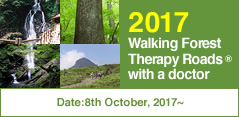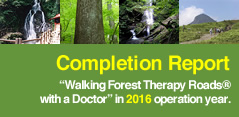A REPORT ON FOREST MEDICINE FROM THE WEBSITE OF COCA-COLA
Last Updated: July 17, 2013
The biggest maker of beverage in the world, COCA-COLA company's website on June 20, 2013 released a report on Forest Medicine titled "Shinrin-yoku: The Japanese Art of Forest Bathing" and introduced the research conducted in Japan. Dr. Qing Li received an interview and introduced his research on Forest Medicine. Dr. Qing Li is associate professor in the Department of Hygiene and Public Health at Nippon Medical School in Tokyo and serves as president of the Japanese Society of Forest Medicine and Vice-President and Secretary General of International Society of Nature and Forest Medicine (INFOM).
The site is as follows:
http://www.coca-colacompany.com/stories/shinrin-yoku-the-japanese-art-of-forest-bathing
This report is based on the following article:
Li Q, Otsuka T, Kobayashi M, Wakayama Y, Inagaki H, Katsumata M, Hirata Y, Li Y, Hirata K, Shimizu T, Suzuki H, Kawada T, Kagawa T.
Acute effects of walking in forest environments on cardiovascular and metabolic parameters.
Eur J Appl Physiol. 2011;111(11):2845-53.
Abstract
We previously found that forest environments reduced stress hormones such as adrenaline and noradrenaline and showed the relaxing effect both in male and female subjects. In the present study, we investigated the effects of walking under forest environments on cardiovascular and metabolic parameters. Sixteen healthy male subjects (mean age 57.4 ± 11.6 years) were selected after obtaining informed consent. The subjects took day trips to a forest park in the suburbs of Tokyo and to an urban area of Tokyo as a control in September 2010. On both trips, they walked for 2 h in the morning and afternoon on a Sunday. Blood and urine were sampled on the morning before each trip and after each trip. Blood pressure was measured on the morning (0800) before each trip, at noon (1300), in the afternoon (1600) during each trip, and on the morning (0800) after each trip. The day trip to the forest park significantly reduced blood pressure and urinary noradrenaline and dopamine levels and significantly increased serum adiponectin and dehydroepiandrosterone sulfate (DHEA-S) levels. Walking exercise also reduced the levels of serum N-terminal pro-B-type natriuretic peptide (NT-proBNP) and urinary dopamine. Taken together, habitual walking in forest environments may lower blood pressure by reducing sympathetic nerve activity and have beneficial effects on blood adiponectin and DHEA-S levels, and habitual walking exercise may have beneficial effects on blood NT-proBNP levels.


